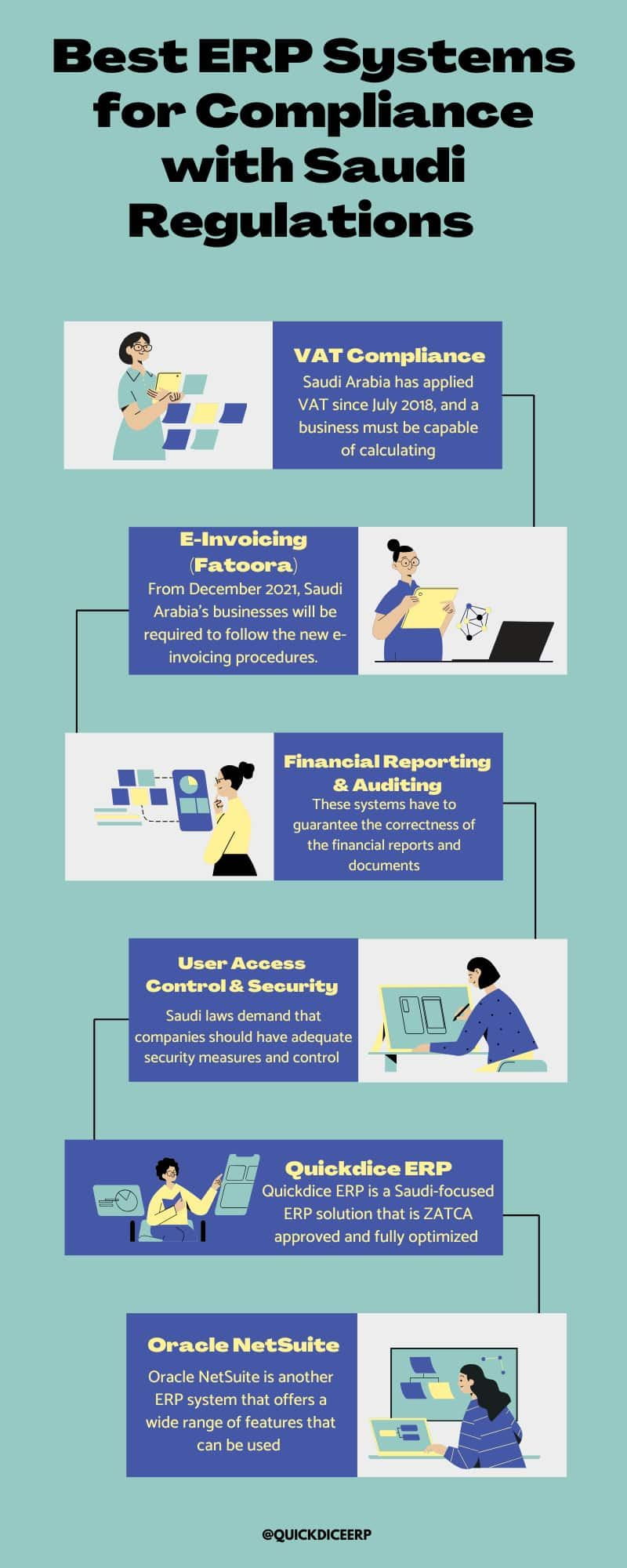Best ERP Systems for Compliance with Saudi Regulations
 Aya Basha
11 Apr, 2025
13 mins read
41
Aya Basha
11 Apr, 2025
13 mins read
41

It is imperative for the business entities of Saudi Arabia to follow the local laws and regulations in the current world of globalization. Currently the country’s regulatory environment especially in the areas of financial management and taxation is dynamic. This calls for the use of proper tools that would not only address the issue of compliance but also the general performance of the companies. One of the tools is an ERP system in Saudi Arabia, which unites the billing, accounting, and compliance management into one system.
Thus, the choice of the right ERP system becomes crucial with the increasing number of Saudi regulations, including VAT and electronic invoices. In this blog, we will discuss the most suitable ERP systems that can address the Saudi rules and regulations and how the billing system within these ERPs can help in simplifying the tax process, making it compliant, and enhancing the overall financial management. For any business, be it small or big, it is essential to know how ERP systems can contribute to compliance in order to avoid the pitfalls that may lead to wastage of resources.

Why it is Crucial to Comply with Saudi Regulations?
Over the past few years, Saudi Arabia has enacted a number of new rules and regulations especially those relating to tax and value-added tax (VAT) as well as electronic invoicing (e-invoicing). These changes that have been implemented by the Zakat, Tax and Customs Authority (ZATCA) call for the establishment of sound software solutions that are able to address the VAT system, invoices and tax compliance.
Noncompliance with these regulations attracts penalties such as fines, audits, and other legal proceedings. This means that, it is essential that businesses select the best ERP system to effectively handle all legal and financial requirements.

What Makes an ERP System Compliant with Saudi Regulations?
In order to meet the Saudi regulations, there are some key requirements that must be met by an ERP system which includes:
1. VAT Compliance

Saudi Arabia has applied VAT since July 2018, and a business must be capable of calculating, collecting, and reporting VAT on the transactions. It is expected that the functionality of the ERP system should include the ability to handle the VAT at national and international levels.
2. E-Invoicing (Fatoora)

From December 2021, Saudi Arabia’s businesses will be required to follow the new e-invoicing procedures. This means that businesses have to produce and archive invoices in electronic format. The ERP system should be interfaced with Fatoora which is an e-invoicing platform used in KSA to issue, store and submit invoices to the authorities.
3. Financial Reporting and Auditing
These systems have to guarantee the correctness of the financial reports and documents, which must be compliant with the Saudi Arabian legislation. This is in the areas of recording financial transactions, tax invoices and payment history that can be easily produced during an audit.
4. User Access Control and Security
Saudi laws demand that companies should have adequate security measures and control mechanisms to protect financial information from being accessed by unauthorized persons. It is crucial to have an ERP system that has good security features and an ability to track who is accessing the data.
Top ERP Systems for Compliance with Saudi Regulations
Below are some of the top ERP solutions that can assist your organization to run a compliant business in Saudi while increasing its efficiency:
1. Quickdice ERP
Quickdice ERP is a Saudi-focused ERP solution that is ZATCA approved and fully optimized for e-invoicing compliance in Saudi Arabia. It offers a comprehensive suite of tools including accounting, billing, inventory, and manpower modules. Designed with local regulations in mind, Quickdice ERP ensures complete compliance with ZATCA Phase 2 e-invoicing requirements. It is ideal for businesses of all sizes looking for a robust ERP system that also supports Arabic and English languages.
Key Features:
• ZATCA approved e-invoicing in Saudi Arabia
• Automated VAT handling and compliant invoice generation
• Real-time dashboards and custom financial reporting
• Seamless integration with local e-invoicing platforms
• Affordable and tailored for Saudi businesses
2. Oracle NetSuite
Oracle NetSuite is another ERP system that offers a wide range of features that can be used to address the requirements of Saudi laws. It also has the capability of supporting Saudi VAT and to create Fatoora compliant invoices through its billing software. There is also a feature of reporting that can be done according to the country or region where the system is being used.
Key Features:
- Automatic computation of VAT and tax returns
- Adherence to the Saudi Arabia e-invoicing regulations
- Real-time financial insights and reporting
- Cloud-based solution with mobile access
3. Microsoft Dynamics 365
Microsoft Dynamics 365 has a solution for the ERP needs of the businesses in Saudi Arabia and is flexible and scalable. It also has integrated billing functionality that means that the VAT compliance is managed effectively, and the system offers e-invoicing integration. Dynamics 365 also offers sophisticated business intelligence and analytical tools and reporting tools that can assist businesses in their compliance and efficiency.
Key Features:
- The use of technology to compute VAT rates
- Interoperability with other e-invoicing solutions such as Fatoora
- Advanced reporting and data analytics
- Seamless integration with other Microsoft tools
4. Sage 300
Sage 300 is a good ERP solution for the small and medium businesses which require a tool for accounting and compliance with the Saudi Arabia tax laws. It has a billing software that calculates VAT and makes sure that all the bills produced meet the legal requirements of the country.
Key Features:
- VAT management and reporting
- Integration with Saudi e-invoicing platforms
- User-friendly interface for businesses of all sizes
- Solution that can be expanded as your business expands
5. Tally ERP 9
Tally ERP 9 is one of the best choices for businesses seeking for a low-cost, but efficient software. It is easy to use, and it is capable of dealing with the Saudi VAT legislation. It also has billing software that enables it to ensure that all its bills meet Saudi Arabia tax laws.
Key Features:
- Simplified VAT reporting and compliance
- Linking with e-invoicing systems for easy submission
- Low training of the software so that even the end-users can be able to use the software without much difficulty.
- Ideal for small to medium-sized enterprises
How Billing Software Plays a Crucial Role in Compliance
Compliance is another area where the billing software can be said to be very crucial. It is crucial for all businesses in Saudi Arabia to issue invoices that are compliant with the VAT legislation. ERP system compatible billing software is crucial for invoices to meet the required legal requirements such as VAT, tax rates, and e-invoicing.
In addition, it is mandatory for Saudi businesses to retain and submit invoices in electronic format for audit purposes. Integrated billing software in ERP systems helps in automating this process by creating, storing and issuing compliant invoices.
Conclusion:
All in all, the choice of the right ERP system is critical for the Saudi Arabian businesses to meet the existing and emerging regulations, specifically, VAT, e-invoicing, and financial reporting. Therefore, when selecting an ERP solution, it is advisable to consider an option that includes billing software to enable automated tax computation, creation of compliant invoices, and record-keeping. This not only helps in meeting the legal requirements but also increases productivity, decreases the number of mistakes, and enables the companies to concentrate on expansion and development.
The increase in regulatory changes makes it mandatory for companies to have an effective ERP system with integrated billing software. In any case, it is crucial to select the right ERP system for your business and ensure that it complies with the Saudi regulations. This way, you can gain the necessary insights to operate in the Saudi market without violating the law and keeping your business safe and productive.
Written By:
Aya Basha



Hotels at your convenience
Now choose your stay according to your preference. From finding a place for your dream destination or a mere weekend getaway to business accommodations or brief stay, we have got you covered. Explore hotels as per your mood.





